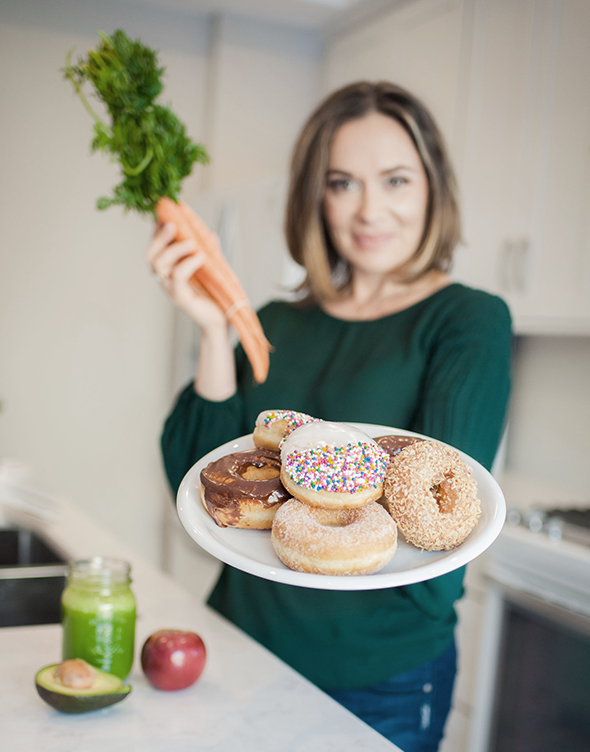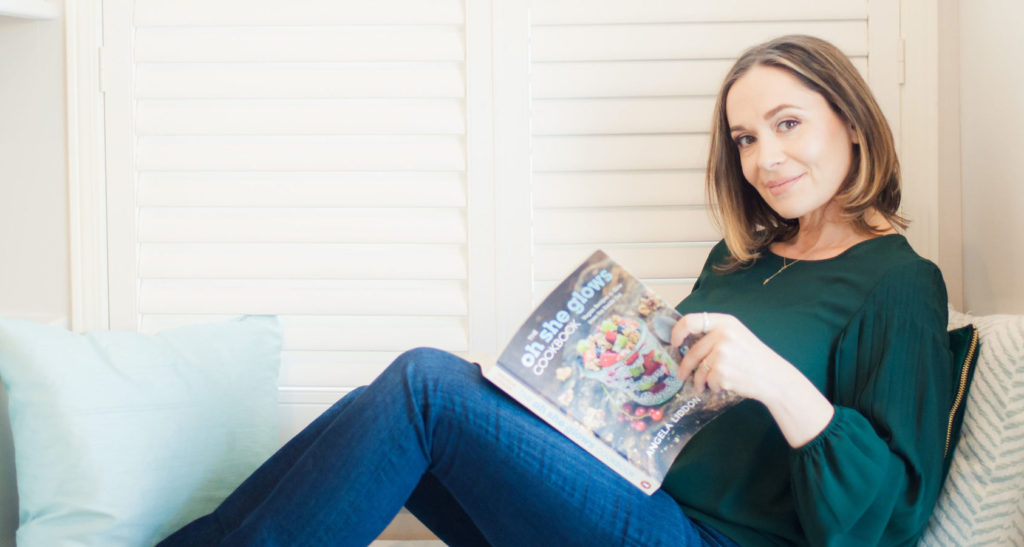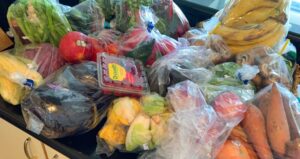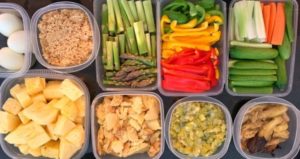Do you struggle with night-time snacking habits?
I did too, for several decades, because on many nights, I simply couldn’t go to sleep unless I ate a smallish, 2nd dinner before bedtime.
But now it’s gone. For good.
Goodbye night-time snacking, hello flatter stomach (and looser pants!)
I haven’t eaten anything after my regular dinnertime since the beginning of November 2019. Not even once.
In addition to night-time snacking, my overeating days are over too. I know, I know… Because of my XS physique, I used to surprise many by how much I could eat… often more than the men well over twice as my size. I am probably still able to… but I don’t want to and I don’t need to.
No more evenings of overeating, subsequent heartburn and a nightcap or two of Alka-Seltzer before bed.
I survived Thanksgiving, Christmas, the Super Bowl party, and many more occasions… without seconds, and with ease.
I can now watch food shows at night without getting hungry. I can have other people eating next to me late at night without wanting to join in.
My secret? Sara Best.

And her FREE resource “Night-Time Snacking Solution”.
Sara Best is a Registered Holistic Nutritionist and Consistency Coach, known to many as “the Nutritionist who never talks about food.” She is the author of the book, “Turning Off the Tap: Overcoming the Real Reasons we Overeat” and the founder of the Consistency Coach School.
Her bio says “Sara has worked with women around the world through her popular Change Your Brain – Change Your Body program to help them reprogram and rewire the way their brains think about food. Using techniques such as meditation, mindfulness, visualization, thought reframing and habit mapping she helps her clients master unique tools that allow them to stay consistent with healthy eating habits and self-care, enabling them to properly fuel and nourish their bodies.”
After I got her freebie, I didn’t initially read it. (Sorry!)
Obviously, nothing changed. I continued with my usual (over)eating habits.
However, once I did read her “Nighttime Snacking Solutions”, I quickly lost my NEED to eat more than necessary. From Day 1, I was able to distance myself from food, or anxious thoughts about food (or “eating for future hunger”). To my surprise I was able to go to bed calmly in spite of my past anxiety. I was able to sleep through the night. I didn’t die from hANGER.
I was blown away.
Day 2. Same thing.
Day 3. Same thing.
And now 3 and 1/2 months and counting… No night-time snacking, nor overeating!
This is huge, because I’ve been known for decades for my “healthy” appetite and “always being hungry”. My friends and family are shocked!
I felt more people needed to hear what Sara teaches, and have a more relaxed, happier relationship with food without relying on willpower, so I asked her if I could interview her.
Read on to learn more about Sara, and her advice so that you could take a first step toward conquering your food fight without willpower.

Sara, what kind of background did you have and why did you start your business?
I worked in the corporate world for many years before going back to school to become a Registered Holistic Nutritionist and meditation teacher.
I started my business because, after working as a Nutritionist for several years and doing what I thought Nutritionists did (create meal plans, post healthy recipes online, etc.) I started to realize that the food wasn’t really the problem. Most of my clients already KNEW what they should be eating and not eating to improve their health and lose weight.
Where they struggled was in sticking with it consistently. I understood on a personal level because this had also been my own problem. I’d been a night-time binge-eater for as long as I could remember and even after going to school to become a Nutritionist, that habit hadn’t stopped. I realized that giving my clients more information about carbs and protein was not helping them (or myself).
I needed to go deeper. That’s when I became obsessed with learning everything I could about food psychology and the neuroscience around our relationships with food. I also learned more about mediation and mindfulness and how we can work with our feelings and thoughts instead of turning to food as a quick fix.
And that’s where my current business was born and it’s also why I’ve now gone on to create The Consistency Coach School to help other health and wellness coaches learn the same approach and tools to support their own clients in this way.
How are you different from other people who are in health coaching/teach about emotional eating and weight loss?
I marry the latest in neuroscience and food psychology with the ancient principles of mindfulness and spiritual exploration to help my students transform their relationship with food from the inside out.
Why do you think consistency and/or keeping sustainable results are so difficult?
Because when you try to change anything in your life you’re literally fighting your own brain. Our brains are wired for habit. They’re literally habit-making machines. That’s why we so often feel like, on the one hand, we WANT to make better choices, but on the other hand it often feels impossible to stick with it.
That’s why I teach that we need to start approaching the healthy choices we want to make in a way that works WITH the way our brains are naturally wired, rather than AGAINST that wiring the way so many of the old approaches (dieting, deprivation, shame and guilt) have done for so many decades.
What are your pet peeves about the health coaching/weight loss industry?
This underlying, unspoken sense out there that the reason you’re struggling is because you’re just not trying hard enough or that you just haven’t done the right diet or eating approach yet. Everyone’s talking about WHAT we’re eating but no one’s talking about the reasons WHY we’re eating it which, in my experience, is where the key to lasting success really lies.
What are the biggest obstacles your customers have, when it comes to emotional eating?
Stress and night time! Those are the two areas that trip people up the most and it’s largely because those are two of the primary times when your prefrontal cortex (the rational decision-maker in your brain) goes off-line and leaves the limbic brain (the irrational pleasure-seeker) in charge.
What are you most passionate about with your approach for those who have challenges with eating?
What I’m passionate about is putting people back in the driver’s seat. I don’t want you to have to follow a diet or meal plan for the rest of your life. I don’t want you to have to watch yourself do really well all day or all week, only to sabotage it all when you’re feeling overwhelmed or when evening time rolls around – that’s no way to live!
I want to give my students the awareness, insight and tools to stay on track with whatever changes they want to make no matter how they’re feeling, what time it is, or whom they’re with.
What made you decide to write your book, “Turning off the Tap”? What is the #1 takeaway for the readers of your book?
I wrote the book as a way to share the unique method and tools I use with my students with an even bigger audience. I wanted more people to have access to this approach.
The #1 takeaway is that trying to run new, healthy behaviors on top of an old, self-sabotaging “operating system” in your brain will never work. You’ll always eventually end up going back to those old habits and patterns that have been programmed into your brain over time. The key to lasting transformation is to start by addressing that operating system first (turning off the tap).
Once you do the work to update that operating system, then it will allow you to adopt and stay consistent with the new, healthy habits you want to adopt – no more fighting your own brain!
Your website says your students joke that you are a nutritionist who never talks about food. After they work with you and change their relationship with food, how do your clients stay on top of what they learn so that they have long-term success?
Once students sign up for my Change Your Brain – Change Your Body program, they get continuous access to the classes, resources and community. This is ongoing work (I don’t have any magic beans that will change your life in 30 days) and it requires ongoing learning, motivation and support and that’s what my students get inside the program.
Who are your favorite experts, most influential podcast/blog/author, etc in healthy eating? And why?
Rich Roll is probably at the top of my list. On his podcast (The Rich Roll Podcast) he sits down with some of the most cutting edge experts in the health and wellness world, in all different modalities, and has long-form in-depth conversations with them. I’ve been more educated and inspired by his shows than any other.
What is your favorite way to engage with your customers/followers and why?
I love live video so doing webinars and Facebook lives on different topics is my favorite way to connect with people. I feel like we’re having a conversation and I love getting the real-time feedback and questions from them.
What’s the best place for people to connect with you online?
My website: www.sarabest.com (lots of free tools there)
My Facebook group (Conquer the Food Fight) with over 23,000 members: https://www.facebook.com/groups/conquerthefoodfight/
One last question, Sara. You have so many great free resources on your site. For those who are new to you, which one of your free tools would you recommend starting with, and why?
I know you loved The Night-Time Snacking Solution (and I’m thrilled) but for anyone new to my work, I’d suggest starting with the Awaken Your Willpower guide (https://discover.sarabest.com/awaken-your-willpower). In this guide I lay out 10 simple “willpower workouts” that can help people struggling with almost any eating habit they want to change.
Thank you so much for a great interview, Sara!
So… do you struggle with night-time snacking?
Please comment below… I’d love to hear from you.









